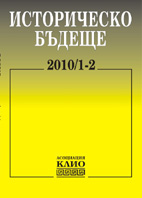Към характеристиката на българската външна политика 1934–1939 г.
To the Characteristics of Bulgarian Foreign Policy 1934–1939
Author(s): Nikolay PoppetrovSubject(s): History
Published by: Асоциация Клио
Keywords: Bulgarian foreign policy; authoritarian regime; non-party governance; Third Reich; Tsar Boris III; “New Order”; Treaty of Neuilly
Summary/Abstract: In 1934–1939 Bulgarian foreign policy was carried out in the conditions of an authoritarian regime and non-party governance, at the lack of free expression of will (parliamentary activity was resumed in 1938 in the conditions of a persistent trend to substitute parliamentary power for the executive) and strict censorship in advance. At the same time, the Third Reich engaged in active policy in the direction of complete change of the status quo on the European continent. The combination of the two trends – the domestic Bulgarian and the international one – lent hitherto unknown impulses to the country’s foreign political positions and to the public debate on the national issue. This period, however, cannot be understood without knowing what happened in 1918–1933. At the same time, a considerable part of the interpretations of the period of time discussed – memoirs, but also studies – are too burdened ideologically or have been subject to interpretations subordinate to stereotypes and mythological notions. The opinions of representatives of the authoritarian, pro-fascist and identifying themselves with fascism circles were disregarded systematically. The same can be said of a number of opinions of individual public figures, intellectuals and so on, which cannot be referred typologically to the main trends of left and right, of fascism and bourgeois democracy or worker and communist movement (according to the prevalent notions until 1989). The presence of the idea of revising the peace treaty is typical of the period, respectively of the post-war status quo as something understandable in itself, as well as the simultaneous emergence of two trends – that of sincere non-involvement and covert sympathy for national socialism. The offered text pays attention not to diplomatic documents and the top brass of foreign politics in the face of the Ministry of Foreign and Religious Affairs, but on aspects that have been overlooked or underestimated in historical studies. The article outlines some trends in Bulgarian society, which reflected on the 1934–1939 period, with a stress on: 1) representatives of the “third generation” – young authoritarians and supporters of fascism, respectively national socialist; 2) opinions of King Boris III on foreign policy and the international situation, inasmuch as he, with his actual role under the authoritarian regime, could be considered as expressing main trends of Bulgarian foreign policy; 3) possible interpretations of foreign policy notions shown in the period under review, with a view to the then increasingly influential concept of unity of the national and social issue. Specific characteristics of the state/society foreign political positions have been outlined – the lack of a concept how to resolve the national territorial problem, the amorphous borders of the territorial revision, the hazy formulations of “flexibility” and so on.
Journal: Историческо бъдеще
- Issue Year: 2010
- Issue No: 1-2
- Page Range: 3-32
- Page Count: 30
- Language: Bulgarian
- Content File-PDF

